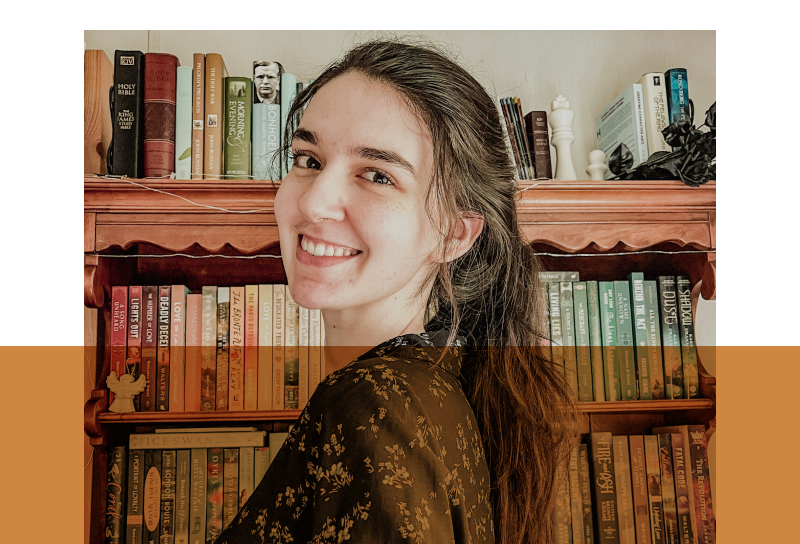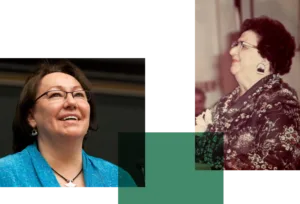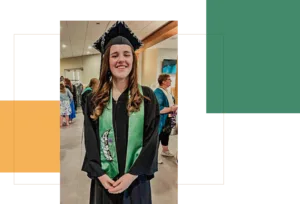It’s always fun to hear what HCOS alumni are up to. Morgan Taylor Giesbrecht (Class of 2018) recently published her first book, and she was kind enough to sit down and answer some questions about her experience writing.
1. Can you give us a brief overview of your new book and what inspired you to write it?
The Lies We Live is a spy mystery set in a small English town against the backdrop of World War One and explores life on the home front. Where, away from the frontlines of the Great War, British Intelligence agents are fighting a battle of their own.
Nurse Clara Dankworth learned long ago to go where her government ordered. Her newest assignment pairs her with fellow spy and doctor Thomas Lindsey to gather evidence on a prominent society figure suspected of being a German sympathiser. But when threats emerge from the shadows, Clara finds that in attempting to escape her past, she hadn’t run far enough.
Though one of MI5’s top agents, Doctor Thomas Lindsey’s maverick spirit often lands him in trouble with his superior. Clara’s unexpected—and unwelcome—arrival as his newest assistant places Thomas’s personal mission in jeopardy as his work of several years threatens to unravel. But in his determination to protect his secrets at any cost, he discovers Clara has more than a few secrets of her own.
When a notorious and elusive rogue agent known as The Piper casts shade on Newhaven, Thomas and Clara are forced to become reluctant allies in order to discover the answers they need––both for England and for themselves. But with an enemy unknown and countless lives on the line, the lies they are living might be far safer than the truth that could ruin them all.
As a writer, I am also an avid reader, and my inspiration for this story came partly in the form of another book. Several years ago, a friend gifted me a novel that dealt with spies and World War One, neither of which I was overly familiar with at the time. Well, I was hooked! Combine that with my love of Sherlock Holmes and my newly kindled interest in Agatha Christie’s murder mysteries, and an idea was born. At the time, I was working on another writing project that was incredibly draining—both on my creativity and on my soul. Needing a distraction, I started writing a few random scenes about a doctor and nurse spy duo, who started as rivals and eventually became reluctant friends. I had no intention of finishing the story or even publishing it, but God had other plans!
2. What themes run throughout the book, and how did you develop them?
At its core, The Lies We Live is the journey of two twenty-somethings facing a world that had crumbled at their feet: full of lost relationships, broken hearts, shattered dreams, and betrayal. They are desperate to fix the messes in their lives but are unsure how. As they try—though varying means—to escape the pain and heartache, they learn (as I did in the writing) that behind every mask we wear and every lie we believe, we can’t outrun the truth.
Loss, grief, and identity weren’t initially themes I planned to write about. But as the story and the characters developed, I found my own struggles with these issues spilling over from my life into my writing. Over the course of the story, I was forced to come face to face with the lies I believed about myself—the lies I was living. I saw the identity I had crafted for myself, instead of the identity I was born to live in Christ. I listened to the voices of those who told me I would never amount to anything, and I believed them. But like Thomas and Clara, I had to learn who I was behind the aliases and the masks. Truthfully, it’s something I’m still learning. In the midst of my own struggles, I wanted to craft a story of hope, light, redemption, brokenness, and healing. Because, maybe instead of trying to be who we used to be, we need to become who we are meant to be.
4. Can you talk about writing and revising this book?
In the writing world, there are 3 kinds of writers—plotters, pantsers, and plantsers. Or, respectively, those who outline, those who write by the seat of their pants, and those who fall somewhere in between. I am in the latter category. While I had several ideas of how the plot might play out, it wasn’t until I was actually writing the scenes that things began to fit together. I was making discoveries right alongside the characters.
I wrote the first draft (which was about 70,000 words) in a month, and over the next two years, it underwent dozens of revisions—from myself, my editors, and my critique partners/beta readers. Drafting was my favourite part, and revising was the hardest. My perfectionism kicked into overdrive during the revision process, and it was thanks to the loving encouragement of several friends that I didn’t end up ditching the project altogether.
That part aside, the entire plot is intricately complex and required a delicate balance. Sorting out the last lingering kinks and plot holes was the most time-consuming part of the revision process.
5. Can you discuss any challenges you faced while writing this book and how you overcame them?
Where to start! Writing a novel was the most labour-intensive project I had undertaken at the time, and it was certainly a test of character. I deal with chronic illness, fatigue, and energy crashes, which made deadlines rather difficult, and more than once I had to let go of my rather ambitious timeline.
Imposter syndrome and perfectionism were other challenges. Most creatives struggle with these at some point in the process, and I can honestly say, community is an important way of dealing with both. Knowing there are people in your corner, particularly other creatives who are in the trenches beside you and know how hard it is, is invaluable. I have some of the best people by my side. We’re all at different levels of experience and at different stages in our journeys, but we have each other’s backs.
While critique and constructive criticism are part of the process and necessary for growth, overcoming my own insecurities from traumatic criticism in the past was another roadblock. I still have my low moments, but some of the best encouragement I’ve received is this—someone needs your words and the story only you can tell.
6. Can you share exciting or surprising things you learned while researching this book?
I have been a history nerd for most of my life, which made the research stage one of my favourite parts! I fell down so many rabbit holes dealing with everything from era-appropriate fashion to the history of tea towels to the use of electric versus gas lighting to war rations.
However, because this book centres around a doctor and a nurse, I spent a good deal of time researching medical practices of the times, and the most in-depth topic was the history of the Spanish Flu. I was drafting this book in mid-2020 while we were still in the middle of our own global pandemic, so researching and writing about a pandemic from a century earlier was both interesting and heartbreaking. The sheer devastation and long-lasting effects of the Spanish Flu are things I never fully realised and quickly became something I will never forget.
7. What message do you hope readers take away from your new book, and what do you hope they enjoy most about it?
In addition to the themes of the book, my hope is that readers will walk away with a renewed sense of appreciation for World War One and the silent heroes we may never know the names of. Studying the World War One era opened my eyes not only to the effects during the war but also on the following years and decades to come. It’s truly an underrated era of history, and if readers come away with a deeper appreciation for the era, I will be thrilled! And hopefully, they will also make a few new fictional friends from this eclectic band of characters along the way!
___________________________________________________________________________
You can purchase Morgan’s book, The Lies We Live on Amazon or follow her on Instagram.



